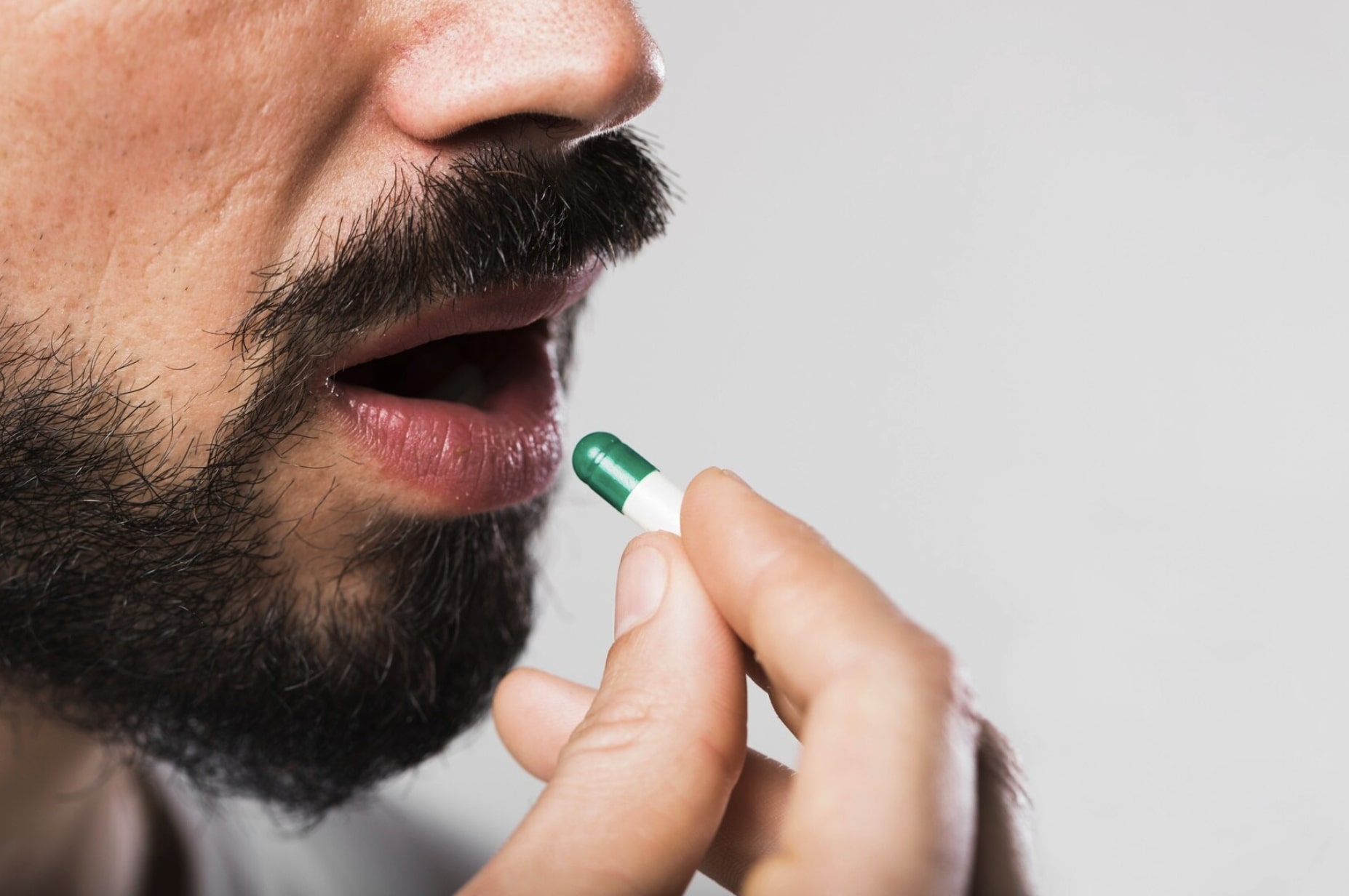Feeling Off Lately? It Could Be Low Testosterone
For millions of men around the world, a hidden factor could be sabotaging their bodies from within. Even if you’re doing everything “right”, you may still find yourself more tired than usual, snapping at people you care about, or just not feeling as strong and sharp as you’re used to. Perhaps you’re also feeling a lower sex drive, are struggling with stubborn belly fat, or just feel a lack of motivation. If any of that sounds familiar to you, low testosterone could be the culprit. While it’s easy to chalk these symptoms up to natural signs of aging or stress, a change in body composition due to low T could actually be the driving factor. Testosterone plays a critical role in men's health, and a decline can have noticeable effects. Many men, however, are unsure how to test for low testosterone or when to seek advice.
In this guide, we’ll answer those important questions, walking you through what testosterone does, how to recognize the symptoms of low T, and how a proper testosterone test can be a game-changer for men with a hormonal imbalance.
What Testosterone Does in a Man’s Body
Recent estimates show that as many as 15 million men in the U.S. are dealing with low testosterone. (1) Testosterone, produced mainly in the testes, regulates sexual function, mood, muscle mass, and other vital processes. Here are just a few of the roles testosterone plays in your daily life and body composition (2):
- Libido and sexual performance
- Muscle growth and strength
- Fat distribution and metabolism
- Energy levels and stamina
- Mood stability and focus
- Sleep quality and recovery
- Bone density
Testosterone naturally declines as you age. Once you hit age 30, your testosterone levels are likely to drop around 1% per year. (3) Lifestyle factors like chronic stress, lack of sleep, poor diet, alcohol, and environmental toxins may also accelerate that decline. (4)
Signs You May Have Low Testosterone
It’s easy to miss the signs of low testosterone, especially because many of the symptoms overlap with other common health concerns. But if you’re noticing a combination of the following, it might be time to get tested for low T:
- Low sex drive or erectile dysfunction
- Fatigue or lack of motivation
- Difficulty building or maintaining muscle
- Increased belly fat or weight gain
- Brain fog, poor concentration, or memory issues
- Mood swings, irritability, or depression
- Trouble sleeping or feeling rested
Some men may experience temporary testosterone dips due to several factors, including acute stress, overtraining, or illness. But when these symptoms linger for months or worsen steadily over time, it may point to a more chronic issue that needs treatment for symptoms to improve. This is especially true for men over 30 who are consistently experiencing any signs of low testosterone. The earlier you identify low T, the easier it will be to address so you can get back to feeling like yourself
Testing Options for Testosterone Levels
If you're ready to get answers about your hormone levels, the good news is that testosterone testing is straightforward and more accessible than ever, such as at your local Gameday Men’s Health location. However, there are some key differences to be aware of when it comes to the types of testosterone tests available.
Blood Tests: The Gold Standard
Blood tests are the most reliable method for measuring testosterone, assessing both total (bound and unbound) and free (bioavailable) testosterone.
- Total testosterone includes both bound and unbound hormones
- Free testosterone is the active form that your body can actually use
Saliva Tests: Convenient but Less Reliable
Some at-home test kits use saliva samples to estimate testosterone levels. While convenient, these are often less accurate and may not provide a complete hormone panel. (5) They shouldn’t be relied on for diagnosis or treatment decisions.
At-Home vs. In-Clinic Testing
At-home kits allow for more privacy and may be easier for some people. However, their accuracy can’t be relied on. Alternatively, in-clinic testing, such as at Gameday Men’s Health, can provide medically precise results with a fast, reliable turnaround. Plus, you get the added benefit of professional interpretation and advice from a licensed clinician.
Does Timing Matter?
Testosterone levels peak early in the morning, so testing is often recommended between 7 a.m. and 10 a.m. However, for men older than 45 and men with hypogonadism, recent evidence suggests timing may be less critical. (6)
Understanding Your Testosterone Test Results
Getting your testosterone tested and receiving your results is just the first step. After receiving testosterone test results, proper interpretation and follow-up are essential.
What Are Normal Testosterone Levels?
Although it may vary slightly depending on the lab, “normal” testosterone levels for total testosterone are generally considered to be between 10 to 35 nmol/L. (7) For free testosterone, the “normal” levels will change by age. Men in their 40s should typically expect levels between 0.2 and 0.9 nmol/L, while older men will typically have smaller ranges. (8)
There is not a recognized consensus on what normal free T levels are. But here’s the catch—just because your levels fall within the “normal” range doesn’t necessarily mean they’re optimal. Many men experience low testosterone symptoms even with levels that sit near the bottom of the range. Your clinician will help interpret your symptoms and your levels to determine the best course of action.
Why Free Testosterone Matters
Free testosterone is what your body actually uses to power libido, energy, and mood. You can have a higher total testosterone number—but if your free T is low, you may still feel many of the symptoms that come with low testosterone. That’s why any quality testosterone test should include both metrics.
Symptoms Over Lab Ranges
The best approach to determining if testosterone therapy is right for you is to combine lab data with real-world symptoms. If you’re experiencing clear signs of low testosterone but your results are borderline, you may still benefit from treatment.
Why Medical Supervision Matters
In the age of online supplements and self-diagnosis, it’s tempting to try and “boost testosterone” on your own. But that approach comes with serious risks. It’s always safer for your long-term health to work with a trusted clinic, such as Gameday Men’s Health to develop a long-term plan for how to boost your testosterone levels.
Over-the-Counter Boosters: Mostly Hype
Many testosterone boosters promise big results but deliver little—and some may even contain unlisted or harmful ingredients. One medical study showed that less than 25% of supplements found online that claimed to boost testosterone actually did so, and over 10% even had a negative impact on testosterone. (9)
The Risk of Going It Alone
Testing testosterone without medical supervision comes with serious risks. This can include misdiagnosis/misunderstanding of your results, leading to potential mistreatment. Self-testing could also lead to you missing serious underlying conditions that a clinician is more prepared to catch. In some instances, at-home testing may even lead to worsening hormone imbalances if tests are used improperly, or if a non-trusted product is used to try and boost levels. That’s why professional evaluation is so important. At Gameday, our providers don’t just look at your labs and hastily determine a diagnosis—they take your full health picture into account and consider elements such as your goals and health history to help you understand what your numbers actually mean.
How Often Should You Test?
For men over 30, testosterone testing is typically performed when symptoms suggest possible low T rather than on a routine basis. If you’ve noticed signs of low testosterone over an extended period, it’s best to contact a qualified clinic for a testosterone test. Current medical guidelines don’t recommend universal screening in men without symptoms, but testing can provide clarity when concerns arise. However, if you’re starting testosterone replacement therapy or are making significant lifestyle changes to improve your levels, you may need to undergo testosterone testing to monitor progress and adjust treatment as needed.
Testosterone Testing & Optimization at Gameday
At Gameday Men’s Health, we take the guesswork out of testosterone testing. Our hormone health consults are designed specifically for men and are fast, convenient, and comprehensive. Here’s what you can expect:
- In-clinic blood draws optimized to ensure accuracy
- Comprehensive hormone panels measuring total, free, and bioavailable testosterone
- Same-day or next-day results reviewed by our team of hormone specialists
- Customized treatment plans based on lab results, symptoms, and overall goals
- Possible treatment options including TRT injections and more
If you’re struggling with symptoms of low T, we’re here to help you every step of the way.
Take the First Step Toward Feeling Like Yourself Again
Testosterone plays a massive role in how men feel, think, perform, and age. If something feels off in your day-to-day life, it’s worth asking the question: could low T be to blame? Recognizing the signs of low testosterone, getting a proper testosterone test, and working with medical professionals to understand your results can make all the difference in your energy, confidence, and quality of life. Don’t settle for guessing—get real answers and real solutions.
If you feel like you’re a good candidate for a test, schedule your testosterone blood test with your local Gameday Men’s Health and take control of your health today.
References
- Low Testosterone
- The Effects of Testosterone on the Body
- Why Are Testosterone Levels Decreasing?
- The Science of Testosterone: Why It Matters and How to Optimize It Naturally
- Clinical vs home Testosterone test
- PURLs: It’s time to reconsider early-morning testosterone tests
- Testosterone
- What Are Normal Testosterone Levels By Age in Men?
- ‘Testosterone Boosting’ Supplements Composition and Claims Are not Supported by the Academic Literature











